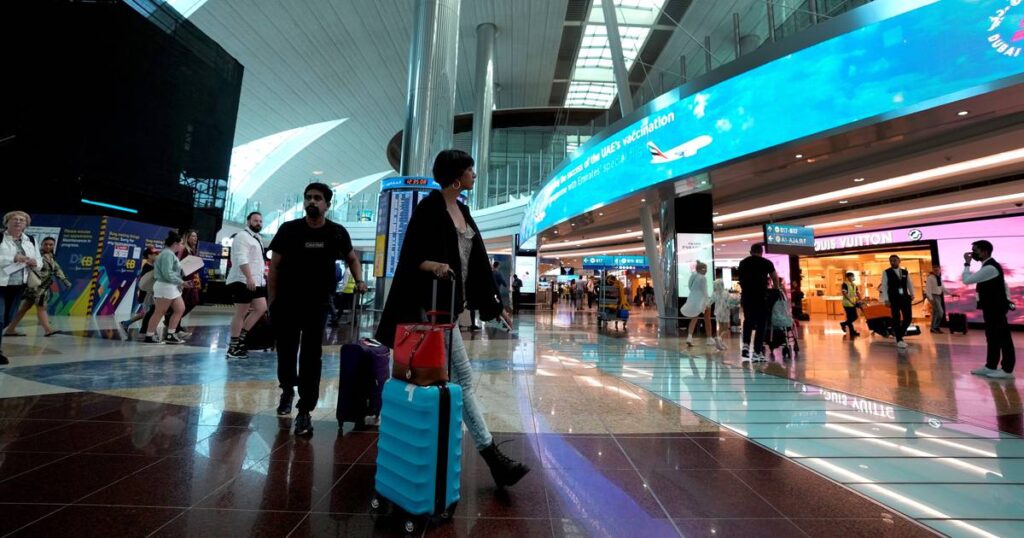Travel at this World Cup was supposed to be easy in the tiny host nation of Qatar, after fans had to take long flights between cities at the last three tournaments.
The eight stadiums in Qatar are in or near the capital, so fans don’t have to go too far to get to matches — in theory.
The country billed its World Cup as environmentally sustainable in part because of how compact it is, but the reality is quite different.
Tens of thousands of foreign fans are turning to shuttle flights between Doha and neighbouring Dubai for a number of reasons — high hotel prices, a scarcity of accommodation and alcohol limits.
It might sound extreme, expensive and environmentally questionable, but the daily flights have become a popular choice as fans opt to sleep somewhere other than Qatar.
Dubai, the freewheeling commercial capital of the United Arab Emirates, is the region’s top destination outside Doha.
State airlines like FlyDubai, the emirate’s budget carrier, are marshalling resources, operating 10 times the number of usual flights to Doha.
Neighbouring Abu Dhabi and Saudi Arabia also have organised air shuttles to cash in on the World Cup tourism boom. Every few minutes, a Boeing or Airbus rumbles overhead Doha’s old airport.
The concept of air shuttles isn’t new to the Gulf, where many who live and work in ultraconservative Saudi Arabia or dry Kuwait hop over to Dubai for the weekend to drink freely and have fun in the glittering metropolis.
Unlike fans who had to take long-distance flights at the World Cups in South Africa (2010), Brazil (2014) and Russia (2018), the Dubai-Doha route is shorter in most cases.
But short flights, often defined as trips shorter than 500 kilometres, are more polluting than long ones per person for every kilometre travelled because of how much fuel is used for take off and landing.
More than a dozen World Cup fans interviewed who chose to stay in neighbouring countries said it came down to cost.
Many couldn’t find an affordable place to sleep in Doha, or any place at all.
As hotel prices soared in the months leading up to the tournament, frugal fans scrambled for spots in Qatar’s far-flung fan villages filled with canvas tents or shipping containers.
“We wanted to stay for five days in Doha. But it was too expensive. We didn’t want those weird fan zones,” said Ana Santos, a Brazilian fan arriving at Doha’s airport with her husband.
“In Dubai, we found a fancy hotel for not too much money. . . The flights are so crowded so we’re not the only ones.
”
After eight years of lying idle, Doha’s former airport is back to life as thousands of shuttle flight passengers squeeze through its halls.
On Thursday (ovenight NZT), Qataris in traditional dress passed out juicy dates and Arabic coffee to arriving fans who cheered and snapped photos while draped in their national flags.
Other fans on shuttle flights were turned off by Qatar’s alcohol restrictions.
The city’s few hotels are almost the only places allowed to serve alcohol, after a last-minute ban on beer in stadiums. Doha’s sole liquor store is open only to Qatari residents with an official permit.
Meanwhile Dubai’s pulsing nightclubs, pubs, bars and other tourist spots are awash with spirits — and at lower prices than in Doha, where a single beer goes for NZ$22 at the official fan festival.
Even in Abu Dhabi, the United Arab Emirates’ more conservative capital, tourists can buy alcohol at liquor stores without a license.
“We want to have a Dubai experience. That’s more interesting for us,” said Bernard Boatengh Duah, a doctor from western Ghana who bought an all-inclusive Dubai hotel package that gives him match-day flights, as well as unlimited food and alcohol.
“We wanted more freedom. “.

